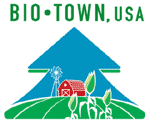Small Town, Big Steps!

Unlike most areas of our country, Reynolds, Indiana is taking a serious approach to becoming independent of fossil fuels. As a result, Reynolds has been nicknamed Bio-Town USA. This town has set an action plan in place to become environmentally friendly. "The long term expectation of the BioTown, USA, project is to completely meet all the energy needs of Reynolds via biorenewable resources, including electricity, natural gas replacement, and transportation fuel. Meeting the energy needs of this town with renewable sources will be the first of its kind in the world, while using environmentally friendly technologies that will convert animal and human waste to biogas, which translates into energy" (Anonymous, n.d.). Now, I understand converting human and animal excrement into fuel sounds farfetched, but apparently there is technology available to do so.
In addition, the at least one gas station in town now sells ethanol and biodiesel. Residents are receiving incentives from General Motors to purchase flex fuel vehicles. I understand purchasing a new, flex fuel vehicle isn’t an option for most of us, but it sounds feasible if you are in the market for a new car.
In addition, the at least one gas station in town now sells ethanol and biodiesel. Residents are receiving incentives from General Motors to purchase flex fuel vehicles. I understand purchasing a new, flex fuel vehicle isn’t an option for most of us, but it sounds feasible if you are in the market for a new car.
Moreover, Wal-Mart has offered residents of the 47980 zip code five free fluorescent light bulbs. Now, even I was a skeptic concerning the impact fluorescent bulbs have on your light bill until reading, "One bulb can make a lot of difference," by Abby Lietz. In her column she states, “A single 15 watt GE compact fluorescent light bulb can save up to $36 a year in energy costs, compared to using a 60 watt incandescent bulb, and uses up to 75 percent less energy on top of lasting about eight times as long.” This was a real eye opener for me; I thought fluorescent bulbs were just nice to have and trendy.
I plan to watch Bio Town closely to see if they really do take animal waste and convert it into natural gas. It is nice to see there are others concerned about our environment and willing to take steps to conserve energy and break away from foreign oil.
References
Anonymous, (n.d.). Bio Town, USA. Retrieved November 28, 2006, from Indiana Office of Energy and Defense Development Web site: http://www.in.gov/energy/biotown/
I plan to watch Bio Town closely to see if they really do take animal waste and convert it into natural gas. It is nice to see there are others concerned about our environment and willing to take steps to conserve energy and break away from foreign oil.
References
Anonymous, (n.d.). Bio Town, USA. Retrieved November 28, 2006, from Indiana Office of Energy and Defense Development Web site: http://www.in.gov/energy/biotown/

1 Comments:
Interesting! I don't know if I actually think this is far-fetched at all. Don't we use that "waste" to provide fertilizer for crops? There is a crazy sort of balance to the goods we get and give in this world, and Renolds, Indiana, is being quite innovative.
Post a Comment
<< Home